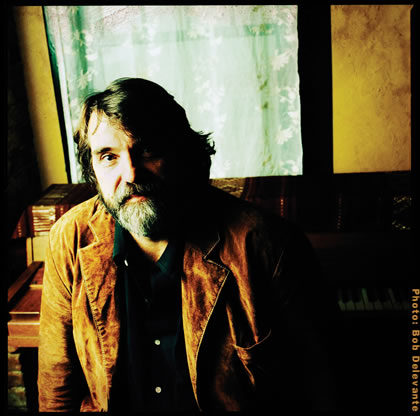
THE INVISIBLE MAN • Darrell Scott
I never yearn to be in another man's shoes, but it must be interesting to be Darrell Scott--to play all those instruments so well, to sing like that, to have those big hits behind you, and the world as your oyster.
It's never that simple, of course; he'd probably be the first to tell you. Just a close listen to his previous Theater Of The Unheard and this current record, The Invisible Man, reminds one that we all have our demons, our skeletons, our inner and outer adversaries, and our trials. But I love the way he puts them on the table and talks to them, and invites us into the conversation. That's an artist, taking something so personal as a life and letting it be as universal as it also is.
Darrell Scott is always making the music of a grown man. It feels like a narcissism-free zone of great songs and great players who are close friends, doing it in real time. His partner Suzi Ragsdale does a lot of fine singing, as do John Cowan and an extraordinary handful besides. His biking buddy and drummer/percussionist extraordinaire Kenny Malone provides the signature backbone and backbeat, along with the uprighteous Danny Thompson on acoustic bass. Richard Bennett on guitar and Dan Dugmore on guitar and pedal steel each played on enough tracks to list them as the band. A host of other luminaries were key contributors.
Aside from a track co-written with the great Verlon Thompson and one by Darrell's late friend Stuart Adamson (of the group Big Country) and Jerry Boonstra, these are all tunes the artist wrote by himself. There's actually grist for the songwriting mill in most every tune, beginning with the opener, "Hank Williams' Ghost," where the provocative title does not actually appear in the song until the final line.
But that's one of the Darrellchotomies that big artists like Faith Hill (who cut "Goodle, USA" off this record) or The Dixie Chicks (who had a big hit with the fantastic song "Long Time Gone") encounter: although there's a certain catchiness to these tunes that can't be denied, one gets the feeling that it's the depth and the integrity involved in the compositions that the artist cutting the song wants to participate in or share. As we've said before, Darrell gets cut by writing great songs, not by writing songs that he thinks could get cut. One doesn't have the impression, in other words, that he writes many songs that he wouldn't play himself.
In this confusing and chaotic time in the music business and in Music City, where the unpredictable rise of a few small independent labels may help the industry reinvent itself, or at least resuscitate itself, I am encouraged by the presence of writers and artists like Darrell Scott who are truly about something, and who love Country music for what it was and still could be. • Frank Goodman
listen to clips return to covers buy it here
darrellscott.com see our earlier interview with D.S.
[designer note: If you haven't yet had the pleasure, you've got to check out Frank's video clip of Darrell Scott at this year's Folk Alliance--it's clip #11 on that page, here.]